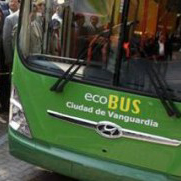 Mexico City plans to introduce 600 CNG buses by the end of 2012. This figure would represent 50 percent of the city’s operational bus fleet, and will be added to the 60 compressed natural gas buses already serving in the Mexican Federal District as of June 2011. The project, which must first be approved by the local government, aims to intensify the use of CNG not only in passenger mass transit but also in the freight transportation.
Mexico City plans to introduce 600 CNG buses by the end of 2012. This figure would represent 50 percent of the city’s operational bus fleet, and will be added to the 60 compressed natural gas buses already serving in the Mexican Federal District as of June 2011. The project, which must first be approved by the local government, aims to intensify the use of CNG not only in passenger mass transit but also in the freight transportation.
Promoters of the initiative cite various reasons for the massive introduction of clean fuel buses, including savings, reducing pollution, and increasing natural gas production in the world. Several international studies, such as one recently published by U.S. oil company Exxon Mobil, stated the fuel’s production and consumption will increase 60 percent globally by 2030. Moreover, in the last 3 years, the price of CNG fell 78.5 percent, according to Mexican news agency Agencia Reforma.
When the project launched with 30 CNG-powered buses in February, 2011 along the Balderas-Santa Fe route, it was the first natural gas-powered fleet in Mexico. The 30 buses, which cost 9 million USD in total, have a capacity to carry 91 passengers and will reduce more than 3,000 tons of pollutant emissions. Three months after the start of operations, the public transport system met a daily demand of 20,000 passengers. To move from anywhere in the city to the business area was necessary to use a taxi or minibus transport; with the new Eco-bus service, travel time has been reduced by over 50 percent. Through September 2011, about two million people had used the Eco-bus service.